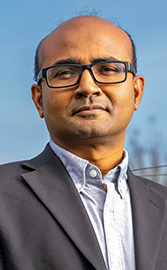
-
Muthu Bagavathiannan
- Professor
Weed Ecology & Management - Office:
- HPCT 341C
- Email:
- [email protected]
- Phone:
- 979-321-5915
- Graduate Education
- Ph.D., University of Manitoba, Canada, 2009
- Courses Taught
- SCSC 651 Weed Biology and Ecology
- SCSC 689-606 Special Topics – Essentials for Plant Systematics and Management in Agronomy
Areas of Expertise
- Weed Science and Agronomy
Professional Summary
Muthu Bagavathiannan, Ph.D.’s research interests fall within the broader area of Weed Science and Agronomy, with particular emphasis on weed ecology and management. The threat of herbicide resistance is immense in broad-acre systems, leading to loss of effective herbicide options, increased herbicide use and unintended impacts on the broader environment. To this effect, the prime goal of his research program is to understand the evolutionary biology and dynamics of herbicide resistance in weed communities and develop integrated pest management (IPM) solutions encompassing chemical and non-chemical tactics to prevent/effectively manage herbicide resistance.
Bagavathiannan particularly uses simulation modeling tools to answer some of the fundamental research questions surrounding herbicide resistance evolution and guide management decision-making. Bagavathiannan’s research takes an inter-disciplinary approach in addressing knowledge gaps (problem-centric rather than discipline-centric) by integrating tools and knowledge from a wide range of disciplines. Bagavathiannan actively collaborates with eminent research groups within and outside the United States.
Support Staff and Students:
Sarah Chu | Rashmi Dangol | Purushottam Gyawali | Joe Johnson | Reuben Kudiabor | Matthew Kutugata | Megan Schill | Gustavo Camargo Silva | Thomas Rushing | Luke Schmitz | Navjot Singh | Ubaldo Torres | Vikas Tyagi